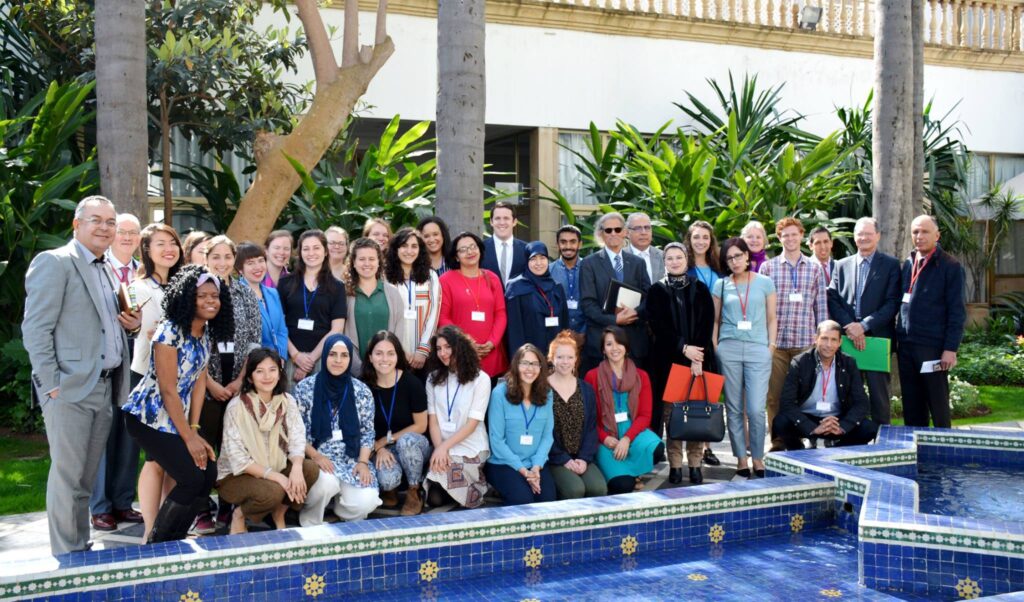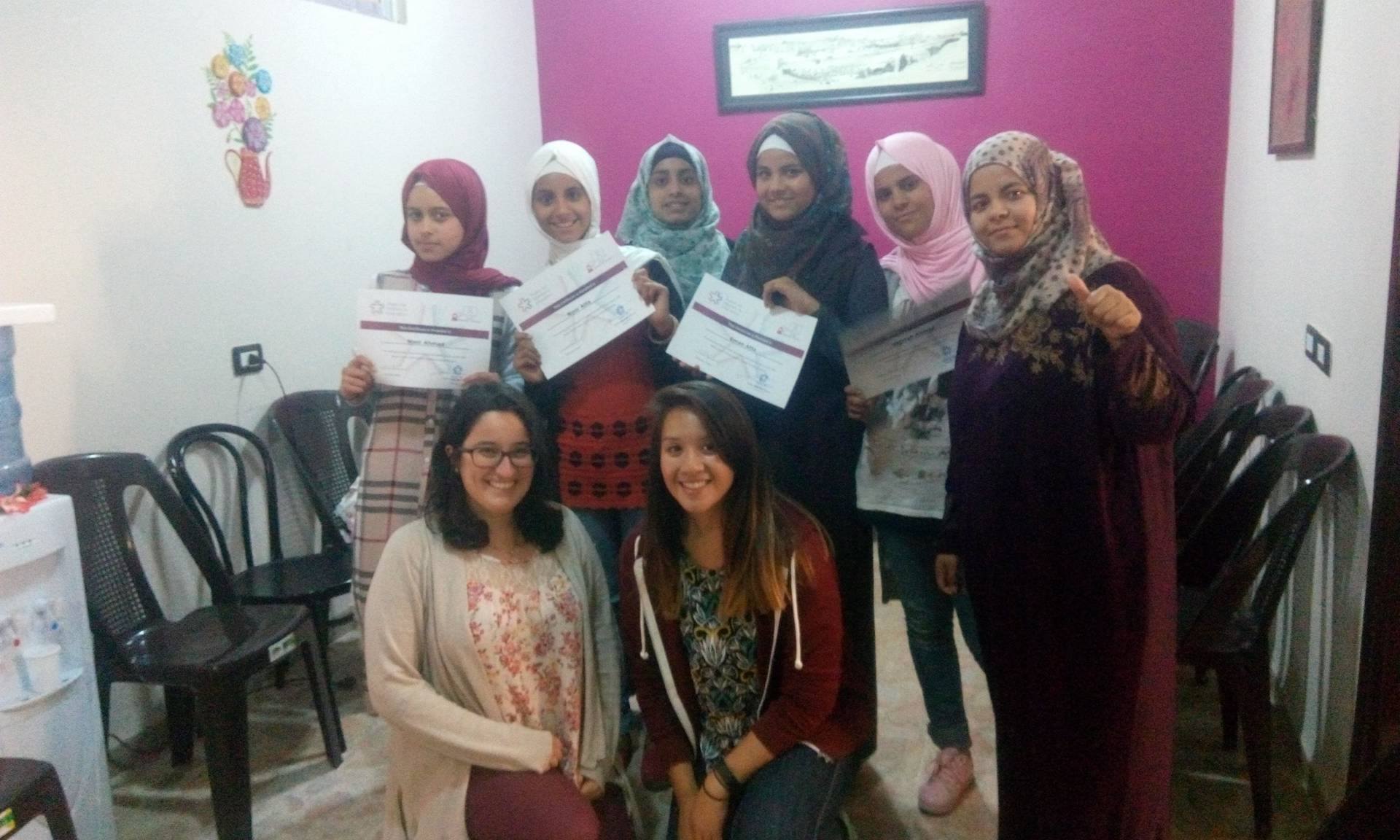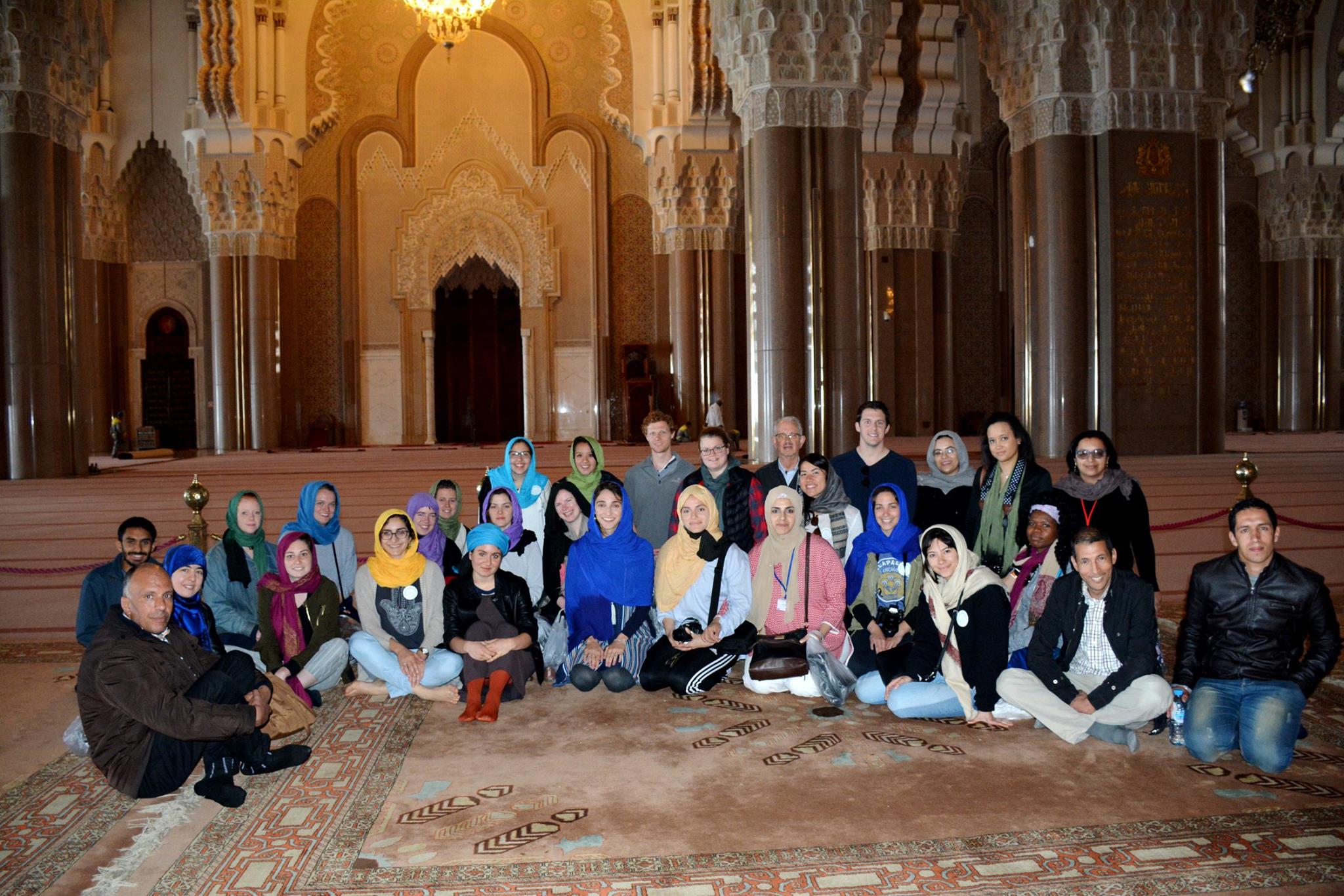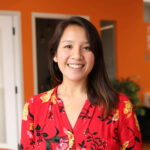
The Fulbright U.S. Student Program Open Study/Research Awards provide 9-12 month-long opportunities to pursue graduate study and conduct research in more than 130 countries around the world. Nina Angeles was a 2016-17 Fulbright Study/Research grantee in Amman, Jordan, where she researched the role of social enterprises in refugee camps in Jordan. In this article, she reflects on how she was raised to see the world as her classroom, and how the Fulbright experience shaped her career trajectory toward Diversity, Equity, and Inclusion (DEI) work. Nina offers advice to anyone interested in applying for a Fulbright or looking for other pathways to pursue research or professional experiences abroad.
Tell us about your background and professional journey. What led you to the Fulbright Study/Research Fellowship in Jordan?
I am a very proud first-generation Filipino-American daughter from an immigrant family that instilled in me the idea that the world is our classroom and that you just need to examine it closely to see what lesson is being taught on any given day. Throughout my life, I have been fortunate to continually learn and relearn what this means in various contexts: growing up in a family of five siblings including two brothers with learning disabilities; working multiple jobs in retail, restaurants, and hospitality during my high school and college years, interacting with colleagues from diverse socioeconomic backgrounds; and getting the opportunity to travel to other countries and learn about people’s upbringing, language, and culture. The Fulbright program aims to bring people together from different corners of the world so that they can engage in a meaningful exchange of each other’s experiences. Even from the outset of the application process, I felt that my personal lived experience was deeply aligned with the values of the Fulbright program.
I knew I wanted to start my career in the international development space after volunteering in high school with a local NGO in Davao City, Philippines, my family’s hometown. I also graduated from high school during a time when the Middle East and North Africa (MENA) region was considered a critical geographic region and this motivated me to focus on this region for the start of my career. I graduated from Northeastern University in 2015 with a bachelor’s degree in international affairs (focused on the MENA) and human services coupled with a minor in global social enterprise studies. Truthfully, I often wondered where my various interests and studies would lead from a career perspective. My studies felt both connected and disconnected – international affairs often entailed political science, while human services and social entrepreneurship more closely correlated with the public sector and business, respectively. I remember learning about the Fulbright program through an on-campus presentation and felt compelled to apply the more I listened to program alumni talk about the opportunity to conduct new research in a host country of your choice. This was precisely the kind of experience I was pursuing – an opportunity to integrate my research and study interests into a fellowship that allowed me to delve into the intricate relationships among the three areas that captivated me.
While studying at Northeastern, I completed a co-op program with the Jordan River Foundation (2012) and spent a semester studying Arabic (2014) in Amman, Jordan. Throughout this period, I was continually building connections and becoming familiar with people in and outside of the refugee camp where I later conducted my Fulbright research in 2016. Midway through my undergraduate studies back on Northeastern’s Boston campus, I enrolled in an introductory course on social enterprise and entrepreneurship. This changed my perspective on the case of using business as a tool to empower communities. This interest sparked a research study in 2014, funded by a research grant, where a friend and I investigated the need for social enterprise educational programs targeting Palestinian refugee youth in two refugee camps in Jordan.
From this research experience and my coursework, I became fascinated with impact evaluations of social enterprises to better understand how these entities were demonstrating their ability to help people and not only prioritize their profitability. This is ultimately what led to my desire to apply for the Fulbright program. I noticed a growing number of social enterprise companies, organizations, and initiatives emerging throughout and/or in partnership with different refugee camps across Jordan. I wanted to better understand the impact of these organizations on their intended audiences. I first applied for a Fulbright grant in the fall of 2014 for the 2015-16 academic year, but it was not accepted. Though I was naturally disappointed, I knew deep down this was what I wanted to do and needed to approach the application process the following year in a more strategic way. I knew that Fulbright often receives and accepts second-time applicants into their programs. I was encouraged by this and decided to reapply.
Throughout my second application process, I served as the Assistant Director of Programs at Northeastern’s Social Enterprise Institute alongside my old professor and mentor, Professor Dennis Shaughnessy. I oversaw content production, program management, and academic recruiting for 200+ undergraduate students across service-learning opportunities, courses, and international field studies. This work in the field of social enterprise education helped me craft my project statement. My statement of grant purpose proposed a study of five social enterprise case studies and their impact on stateless Palestinian refugees in Jordan. To further bolster my credentials, I also completed a certificate program in social enterprise management and impact investing with the Middlebury Institute of International Studies in their Frontier Market Scouts program. The culmination of these experiences, along with intensive review and constructive feedback from my team of mentors, professors, and peers, led to my acceptance into the Fulbright Program in April 2016. I was elated at the opportunity to put my theories and interests to the test through the Fulbright program.
When I returned from my Fulbright experience (which, by the way, I can’t believe was already 6 years ago!), I joined a local workforce development nonprofit in Boston as an internal program evaluator to deepen my technical research and analysis skills. Shortly after, I was recruited from the nonprofit sector into my current role space in the recruiting field, partnering with nonprofit clients. I’m passionate about ensuring hiring processes are equitable and inclusive for all communities and people, and I am an advocate for helping the nonprofit sector identify talent and leadership that reflects the communities they serve.

During your Fulbright, you designed and led an interview-based investigation into Jordan’s Jerash ‘Gaza’ refugee camp. Can you share the motivation and process?
Over my time in Amman, Jordan, as an undergraduate student from 2012 to 2014, I built relationships with people from Jerash camp, locally known as the ‘Gaza camp’. Learning about people’s stories and the challenges they and their families faced accessing what we would think of as basic human rights in the US – income, health insurance, education – sparked the question in my mind of whether a social enterprise approach could help alleviate some of these challenges in this community. My introductory course to social entrepreneurship led me to my research interest in understanding social entrepreneurship in the MENA region broadly – what did it look like in practice, how were social enterprises leading their work, who was starting them, and what impact were they making in the region? I wanted to understand whether these organizations were genuinely achieving their intended impact.
While crafting my project statement, I found some literature on the intersection of social enterprise activity in the MENA, though it was not extensive. My initial research framework and readings came from several different NGO frameworks and reports that related to more international development or humanitarian efforts regarding refugee camp conditions. I additionally used an eight-part evaluative framework from my undergraduate course on social entrepreneurship to assess the strength of these five case studies in the Gaza camp. From the beginning, I wanted to prioritize my findings through a triangulated approach of 1) case study research, 2) stakeholder observation and engagement, and 3) participatory action research co-designed with people who would become colleagues and later friends in the camp. I became a volunteer with one of the organizations in my case study research and connected with community leaders in this initiative who reviewed my survey and interview questions I would ask Gaza camp residents. My Arabic language skills were decent throughout my time conducting research in Jordan, however, it was helpful to corroborate participant responses from interviews with colleagues who were from the camp and had lived there most of their lives.
Ultimately, my Fulbright research revealed complex, nuanced findings beyond the simple conclusion that small social enterprises that employ camp residents help improve the conditions of the Gaza camp community. The short answer to whether these case studies were helping the community was yes. However, there were significant historical and political challenges between the government of Jordan and this camp. There were community leaders within the camp who wanted to keep the community status quo. The gendered norms and customs within families were still very apparent and though they are changing, certain ways of life have been maintained over the last 40-60 years, in particular for women and their ability to obtain education. While my research findings have not been formally published, I have delivered informational presentations at universities and workplaces. My hope is to continue building upon this research. Believe it will continue to inform both my work within the local and global mission-driven sector and my research in the US.
Can you describe what a week in your life during your time in Jordan was like?
I applied for the Critical Language Enhancement Award (CLEA), offered through the Fulbright Program, which allowed me three months of paid Arabic language studies to help support my research efforts before diving deeper into the field. I began my Fulbright fellowship with five days of Arabic language classes in the Modern Standard Arabic (MSA) format and local Levantine dialect. This was a great way to get reacquainted with the language before embarking on field research. My classmates and I would often take a taxi from Jabal Al-Webdeh, the neighborhood many expats live in for their semester or year in Amman, to the Qasid Institute where we had class once or twice a day. I’m a huge nerd, and I love learning, especially languages.
The following 9 months of my Fulbright year involved designing and executing my research project. This included conducting in-person interviews (both in English and Arabic) with camp residents and people employed by the organizations I was studying, documenting case study write-ups and findings, and facilitating English language and professional development workshops with the local program in Gaza camp where I volunteered and studied as part of my research. Many weekends I also taught workshops to women at one of the community centers in Gaza camp where a lot of the camp residents and program participants I worked with would come together to learn, socialize, and form a community with one another. These weekend experiences in the camp helped me get to know the community better. To really immerse myself in Amman when I returned as a Fulbrighter, I rejoined Dozan wa Awtar, a nationally recognized choir. I was a member in 2014 and sang in concerts and nationwide tours throughout my year studying abroad in Amman. Every week we had practice after class or my field research in the camp. I’d head over to our practice center in Shmeisani for vocal warm-ups and song workshopping. We performed songs in Arabic, English, Maori, and Samoan the year I rejoined.

The Fulbright Study/Research Award offers U.S. students and professionals an opportunity to travel and gain international professional and academic experience in a variety of fields. Tell us about how your Fulbright impacted you. How did this opportunity impact your career goals and opportunities?
My time as a Fulbrighter still impacts me today. Though I can’t speak for everyone, I think many people who have completed the program feel similarly or at least continue to reflect on their Fulbright experience. The Fulbright program helped me determine my initial career direction and interest in pursuing technical research and data analysis skills. My role at a Boston-based workforce development nonprofit immediately after my Fulbright allowed me to learn various skills including quantitative and qualitative research methods; survey science and administration; and data extraction, cleanup, and analysis. Without Fulbright, I’m not sure I would have chosen to pursue research and evaluation work. To date, I have built a research career across the academic, nonprofit, and corporate worlds. The kind of research I lead today in recruiting for the nonprofit sector is not as theoretical or evaluative as before, but the real-life application and implications of the work I’m doing have almost always an immediate impact as we help people and leaders in their career paths.
My time in the Fulbright program also helped me gain a deeper appreciation and curiosity for diversity, equity, and inclusion (DEI) conversations within a global context. Today, I often think about a question connected to my time in Jordan: Why is it an accepted norm that women have inequitable access to formal and informal communities, networking, and social capital? And why is it so normalized for it to be a challenge to grow those opportunities for women? In light of the recent decision by the Supreme Court of the United States around dissolving affirmative action in the college admissions process, the conversations we have in the US around uplifting diversity (across categories including but not limited to race, gender, age, religion, sex, ability, gender expression, sexual orientation, citizenship, weight, and more) is critical for the future of education and the workplace. Despite what people might suggest about DEI as a ‘dying field’ in relation to the trend of decreased DEI-focused positions and training across several sectors, DEI efforts will continue whether it has the momentum to back it up or not. My Fulbright experience bolstered my belief in the importance of ensuring that representation and recognition of students and talent from a wide variety of backgrounds leads to more positive outcomes.
What advice do you have for others applying for the Fulbright program?
Build, nurture, and lean on your communities and networks, especially if you have people in your circle who share overlapping interests with your research focus. It would not have been possible for me to secure a Fulbright fellowship without the help of my university’s fellowship office, mentors, professors, peers, colleagues who had completed the Fulbright program themselves, and family and friends who encouraged me throughout the application process. My application was reviewed multiple times by various people who knew me and my research interest. The support and feedback from my community absolutely strengthened my application.
Most importantly, just go for it! I applied twice to the program and while I didn’t get accepted the first time, I did the second. That is what opened a door for me to experience the unique and immersive professional development opportunity that is Fulbright. I am grateful for the conversations we are having more vocally today in the US about the intersection of our race, gender, age, socioeconomic position, and various identifiers that impact the way we interact with the world. As a woman of color in that academic environment, it felt natural to dismiss myself or opt out of the process when I didn’t get into Fulbright the first time. I am so glad I chose to reapply and took a chance on myself again. I look back on that time with a sense of pride – one that I hope the family I’ll raise one day will also feel when they pursue their goals.
Do you have any other reflections you would like to share?
If a program doesn’t accept you, apply again. Even if you’re not accepted after the second attempt, apply again and keep your eyes open for what else is out there. For example, global health leader Paul Farmer was someone I looked up to very much. Although he wasn’t accepted into the Fulbright program, he made an incredible impact on the world through his work at Partners in Health and the public health sector before passing away. As much as I loved my Fulbright experience, I also want people to remember that there are many programs and pathways to achieve your goals and pursue your interests. I don’t think there is one right way or program to guide your work. If the reputation or prestige of a program is non-negotiable (don’t feel shame, just own it), then, sure, prioritize it. However, I think that it can also be detrimental to think that we are only as valuable as the accomplishments we achieve. The older I get, the more I realize both how meaningful my international Fulbright time was as well as how meaningful my time back home in the US is with family and supporting the work in my own backyard.
Interested in applying for a Fulbright? Check out these articles with Fulbright Application Tips. If you want detailed instruction and insider strategies for your Fulbright application, check out our Fulbright Applicant Mastermind workshop.
Nina Angeles is a first-generation Filipino-American, daughter of immigrants, and
© 2023 ProFellow, LLC, all rights reserved.